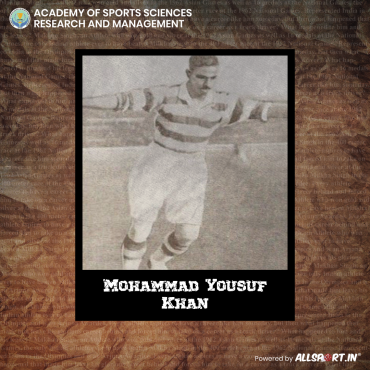The Galloping Horse
The Rise of a Hero
The year was 1962, and Indonesia was hosting the Asian Games. India’s gold-medal-winning football team was arguably the greatest in the country’s history. The Indian chef-de-mission to the Asian Games in 1962 had chastised the hosts for excluding Israel and Taiwan for political reasons. As a result, the crowds were hostile to India from the start. In front of an anti-India crowd in Indonesia, India triumphed in the final, defeating a formidable Korea team 2-1, a team that India had lost 2-0 to in the opening match of the group stage. These footballers from India belonged to a rough breed of athletes. It was a life-or-death situation for them. If there was one player in this squad who stood out, it was none other than Mohammed Yousuf Khan, the midfield maestro.
Yousuf Khan, who was born in Andhra Pradesh on August 5, 1937, is regarded as one of India’s best all-around players. He was famously known as “the bearded horse” because he used to gallop across the pitch like a horse, directing the action in midfield. He was a key figure in India’s victory at the Asian Games in 1962, and he was deservedly awarded the Arjuna Award in 1966.
Khan was a key member of the famous Hyderabad City police team in the late 1950s and early 1960s and died in 2006. He was one of only two Indians to be named to the Asian All-Stars XI in 1965. His dominance over the games was so great that even the association accepted it.
The Unfortunate Turn of Events
Yousuf Khan was one of those athletes whose life took an unfathomable and dramatic turn of events that no one can explain, even though they keep asking what and how it could go wrong. Despite suffering three head injuries during his playing career, he continued to play, demonstrating that football was much more than a game to him. When he was on the field, he had no hesitation in giving his all for the squad.
The 1960 Rome Olympian may have brought the best of defenses to their knees in his day, but as he grew older, he was fighting a lonely war for survival, with little help. This senior footballer was pondering whether players of his generation were justified in sacrificing so much on a personal level, including wellbeing, to gain national recognition and fame. But why had such a thought occurred to him in the first place?
The head injuries were blamed for his Parkinson’s Syndrome, which he would develop in 1994. The legs that had previously worked wonders on the field were now bloated and unable to support him. The champion player’s inability to walk even a few paces at home and pain when standing up showed that he was in excruciating pain. In the worst-case situation, it was a sight that no sportsperson would dare to imagine.
Forgotten by the Nation
In one corner of his three-room house in Hyderabad, where the roof was an asbestos sheet and dust powdered every surface, stood two cupboards, repositories of his manhood: chipped medals, rusting cups, frayed clippings. He didn’t have anything else in his possession. He recalled times when he couldn’t afford to have his shoes repaired because he couldn’t afford a cobbler. The pension was used to help him cope with his illness and support his family.
Mohammed Yousuf Khan sat in the sun one day, trembling. A passing schoolboy stopped to inquire about his trembling hands. “Didn’t you do some physical activity when you were young?” he asked, directly as a teenager. The words “Arjuna Award” on the nameplate had escaped the boy’s attention. The youngster was unaware that India had won the Asian Games football gold medal in 1962, defeating South Korea. Just two men from that squad made it to the Asian All-Star XI, which the boy had not read.
When the boy asked if he’d ever done any physical activity, Khan replied, “Yes, I played football.” “You should have played cricket,” the boy said.
On July 1, 2006, he undeniably embraced death’s bed, and one wonders if he really should have.

Parting Note
Few Indians born in the twenty-first century are aware that the golden years of Indian football spanned a decade and a half, from the 1948 London Olympics to the 1962 Asian Games in Indonesia. Things would have been very different if India had made the trip to Brazil in 1950. “Indian football would have been on a different stage if we had taken that journey,” said Sailen Manna, who would have been the captain of that team.
If the government or sports authorities had taken the appropriate measures to recognize achievements, the unequal treatment of our respected athletes would never have occurred, and tragic stories like Yousuf Khan’s could have been avoided.

